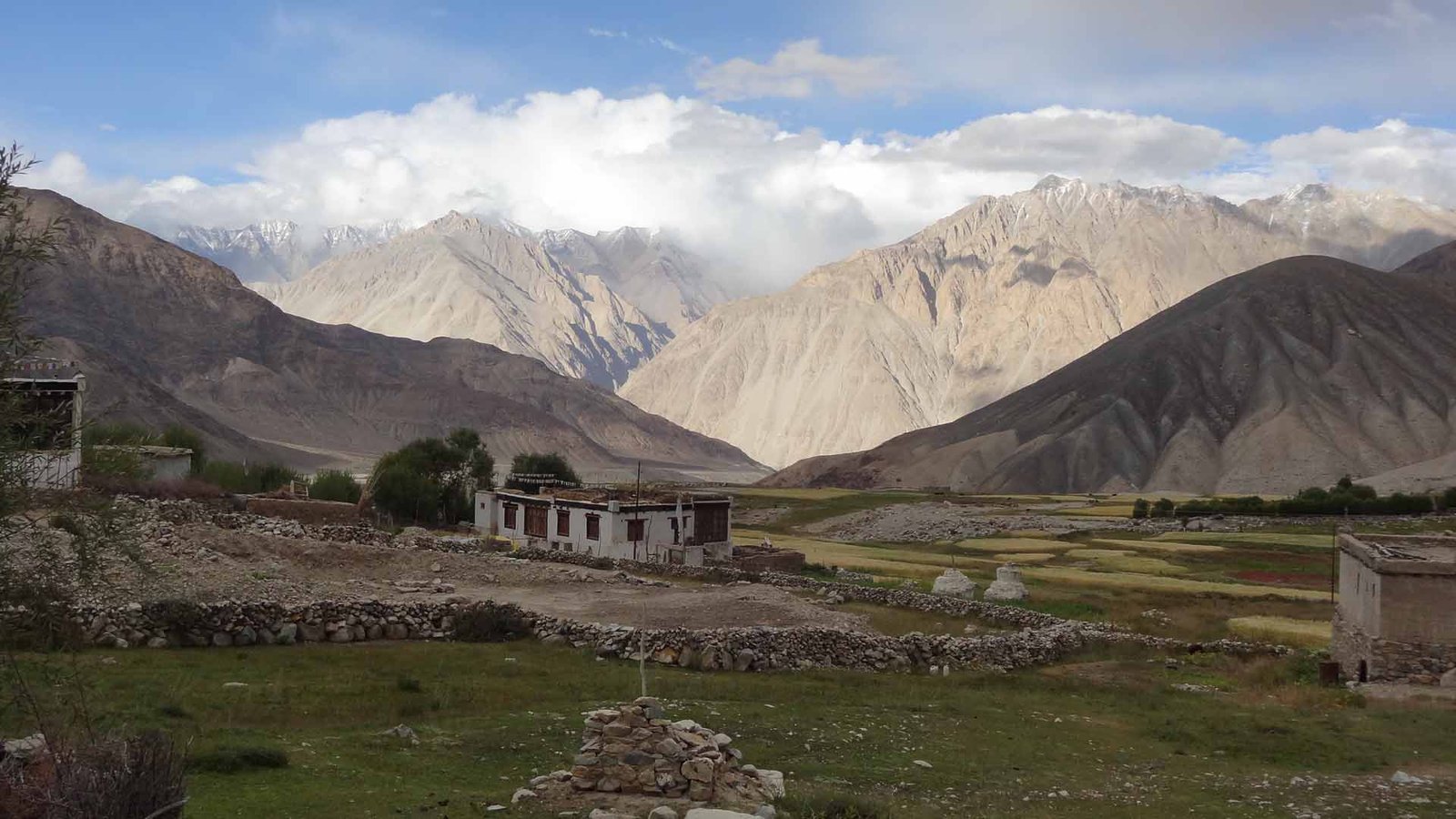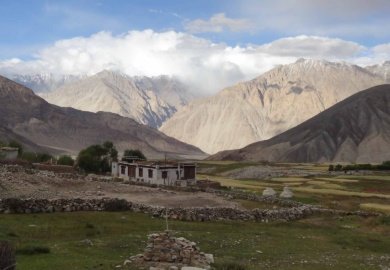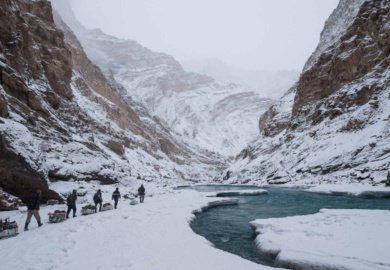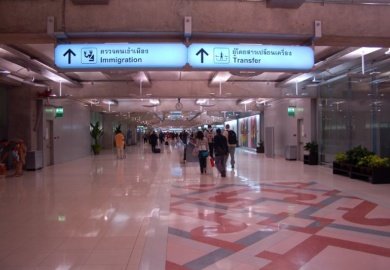Reading the signboards and knowing when to stop.
“Some roads don’t end.
They simply change their mind, turn into wind, and carry on without you.
Wisdom is the small art of stepping aside without resentment, without noise.”
Prologue: Spring That Still Remembered Snow (2016)
Ladakh in early spring is an almost a valley mid-breath, a road mid-sentence, the sun warming its hands but not taking off its coat. In 2016, I came back in that in-between. Work had been a stack of polite emergencies; I had been good at answering other people’s calendars and bad at listening to my own. So, as always, I returned to the only syllabus that makes sense to me: road, sky, tea.
I had an ordinary plan Leh → Karu → Sakti → Chang La → Durbuk → Tangtse → Pangong and an immodest curiosity. People had been saying a phrase in chai stalls and on cold patios as if tasting a rumor: Chang Chenmo. Not the pass most travelers boast about, not a lake with postcard blue. A valley a long, high corridor that bends east toward histories maps still quarrel over. Aksai Chin lives in the sentence after it; so do checkposts and laws and the good sense to behave.
I didn’t want to “do” Chang Chenmo. (In Ladakh, the verbs you pick matter.) I wanted to read hints to follow a road until it turned into advice, to learn how signboards speak, to practice stopping not as defeat, but as manners.
“Don’t go looking for lines,” my host in Leh said, handing me a thermos. “The line will find you.”
The Leaving: Leh to Karu, the Old Litany
We rolled out before traffic could remember its own name. Leh yawned dogs changing corners, a baker sliding round loaves out like small suns, the palace still brooding over all of us like a difficult ancestor. My bike faithful, forgiving coughed into the morning as if rehearsing humility.
The Indus kept us company, a strip of steel, then jade, then something without a name. Karu came with its kiosks and workshop hands stained the deep brown of expertise. I topped up petrol I didn’t need yet because Ladakh has taught me paranoia with a smile. A man in a wool cap asked the correct question, the one that matters more than “where from”: “Where next?” I said “Tangtse.” I did not say “and then let’s see.”
He nodded as if approving an exam I had not taken. “Slow,” he said, then added, “Wind.”
BRO signboards should get author credits. The yellow placards earnest, punny, sometimes profound by accident were already at work. BE GENTLE ON MY CURVES. AFTER WHISKY, DRIVING RISKY. IT IS NOT RALLY, ENJOY THE VALLEY. The mountains, meanwhile, practiced their own grammar: shadow comma, snow clause, an avalanche that had made its point and gone home earlier in the month.
Chang La: The First Ask
Chang La in spring is a decision the weather makes and then revises, like a bureaucrat who remembers a rule just as your papers reach the desk. The climb was a negotiation patches of packed snow learning to be water, black ice telling the truth only if you looked slant, wheels wondering whether rubber could also be prayer.
At the top, prayer flags rehearsed their busy music. A signboard did what signboards do best: provided certainty. “WELCOME TO CHANG LA.” Another, more honest, added, “PLEASE DO NOT STAY AT PASS FOR LONG.” I didn’t. I offered the place a breath and my gratitude and kept moving, learning again that in Ladakh you never really “arrive”; you just pass correctly.
The descent loosened its jaw. Past Zingral and the Army camps named with a humor that belongs to people who do difficult things well, the tarmac showed kindness again. Meltwater threaded silver through the slopes, puddles holding sky until the wind changed its mind.
Tangtse: Tea, Permits, and a New Vocabulary
Tangtse is where roads decide what they will be when they grow up. It is a town, yes, but also a junction of intentions Pangong to the northeast, Phobrang/Marsimik La to the north, Chushul and further to the south. Tea here tastes a little like a committee meeting and a lot like relief.
Permits were checked in a room where rules had the dignity of routine. My inner line permit read like a hymn Durbuk, Tangtse, Spangmik, Man, Merak, Chushul and then trailed off where maps don’t. The officer scanned it, then scanned my face.
“Don’t go looking for adventures,” he said mildly. “Read the boards.”
In Ladakh, that sentence carries everything: country, caution, courtesy.
The Grammar of Signboards (and How to Hear Them)
We talk about roads as if they are lines on a map. In Ladakh, they are conversations between stone and tire, river and bridge, the present and a dozen histories. Signboards are the footnotes to those conversations. Read wrongly, they are spoilers; read well, they are gifts.
- BRO yellow speaks like a stern aunt with a sense of humor. Safety, sobriety, sanity.
- White military boards speak in verbs: STOP, WAIT, PROCEED, SURRENDER MOBILE PHONES. This is law with a please and thank you folded in.
- No Photography boards are not suggestions. Cameras convert places into product. Some places prefer to remain themselves.
- Protected/Restricted notices are not about you. They are about everyone else the people who live and serve and stay.
That morning, just outside Lukung, a white board with blue letters introduced itself. “PHOTOGRAPHY STRICTLY PROHIBITED BEYOND THIS POINT.” A quieter one beside it added: “CIVILIANS NOT ALLOWED BEYOND PHOBRANG CHECKPOST WITHOUT SPECIFIC PERMISSION.” The smaller font was doing the heavier lifting.
I stowed the camera. I put away the part of me that likes souvenirs.
Pangong, Briefly (Because Blue Is Not the Point Today)
The first sight of Pangong always feels like cheating. You round a bend, thinking in rock and grit, and suddenly someone has laid a mirror in the valley, too blue to be polite. In spring, the lake wears a torn coat floes slumping against the shore like excuses, strips of open water shivering with light, ice still holding the middle hostage. Tourists were few, the blesbok-colored dogs watching their absence with an insulted dignity.
I didn’t linger at the onion-domed cafés that will be busy a month later. I took my chai at a quiet shack run by a man whose face has been edited by wind and who believes in short sentences. He pointed his chin toward the north.
“Phobrang?” he asked.
“Maybe,” I said, the way you admit you’re thinking of trespassing at a party where you’ve been a decent guest so far.
He shrugged, a Ladakhi shrug that contains the word “your life” without any malice. “Read the boards,” he said. Everyone was in on the joke. The mountains too.
Phobrang: A Gate That Smiles and Says No
The road to Phobrang unspools off the Pangong margin like a thread you’re not sure you should pull. The lake stops gossiping after a kilometer or two, and dirt takes over a wide, high plain where the wind moves furniture without asking and the light changes its mind too often to keep track.
A checkpost appeared the way reality appears when daydreams have enjoyed themselves. A barrier in the middle of everything. A board with NO on it, politely phrased. A jawan with the patience of a teacher who has seen too many students misread the syllabus.
“Permit?” he asked.
I passed over my paper. He read it gently, as if it were a recommendation letter I would not want him to find flaws in. He pointed to the string of allowed places names my mouth already liked.
“Marsimik La? Chang Chenmo?” he asked, like a man who sharpens the knife and then asks if you’d like the last slice of cake.
“Curiosity,” I said.
“Curiosity is a good traveler,” he replied. “But not a good driver here.”
We both smiled. He didn’t send me back rudely. He suggested. “Go to Chushul,” he said. “The road will be enough for your day. And your eyes.” He gave my shoulder a brief, careful pat the kind of contact that communicates no harm and no argument.
I turned the bike around. It didn’t feel like retreat. It felt like manners.
“A closed gate in the mountains is not humiliation. It’s hospitality with boundaries.”
Man and Merak: Where Blue Learns Green
Man and Merak are the villages that teach Pangong to stop showing off and start living. The lake here is quieter; the road loses its asphalt and gains its honesty. Man offered a tea house hung with the winter’s heavy curtains, a child who drew a blue rectangle and insisted it was the lake (he was right), and a woman who asked if my mother worried when I rode alone. I told her yes, and the air between us softened.
Between Man and Merak, signs started changing tone. “NO DRONES.” “NO STOPPING NEXT 5 KM SENSITIVE AREA.” A white rectangle with the most powerful sentence in the valley: “NO PHOTOGRAPHY.” Every cell in me that likes to collect protested; the part of me that likes to belong said amen.
At Merak, a young soldier with a face the wind had not yet negotiated with checked my permit again, nodded, and said the line that is Ladakh’s unofficial blessing: “Go slow.” I did.
Reading Hints: The Land as Librarian
Toward Chushul, the shore becomes suggestion. The road divides into braids you choose between without the guarantee that choice will make sense. A strip of fresh tire marks recommends one line; old stones suggest another. The wind, a bureaucrat in no mood, stamps every decision with dust.
Then, the hint: a signboard, white on blue, arrow east, a name I had been listening for: CHANG CHENMO. Not an invitation; not a dare. An acknowledgment. Somewhere out there, a valley unrolled toward emptiness humans like to map and argue over. Somewhere, a road called Tsogtsalu, a post called Hot Springs, a line the world had drawn and the land had half-erased. Somewhere, a “no” that kept people alive.
I did not take the arrow. The board itself was the gift: proof that the rumor had bones. And that bones prefer not to be disturbed.
Chushul: The Village That Understands Maps Better Than We Do
Chushul sits in that way border villages do half turned to the road, half turned to the sky. There’s a war memorial on the way to Rezang La (whose courage is in every schoolbook worth reading), there are fields that prefer barley to memory, a school where chalk learns new names every year, and men who carry the weather on their faces like qualifications.
A tea shop listened to my breath long enough to decide I deserved sugar. The owner pointed with his eyebrows toward the south. “Tsaga La?” he asked. I said “No, Nyoma.” He nodded, neither impressed nor disappointed. Before I left, he touched the thermos I carry and said, “Refill,” in the tone of someone who has decided you should have warmth.
At the checkpost, the officer inspected my permit and returned it with a care that felt like a compliment. “No stopping for photographs,” he reminded me. “If you must stop, stop for prayer or water.” It is the best instruction I’ve ever been given on a road.
The Ethics of Looking (Interlude)
I write for a living sometimes. Which is a fancy way of saying I am professionally tempted to turn places into sentences. Ladakh resists this gently, firmly. So here, for the record of my own conscience more than yours:
- No photography where boards say no. Full stop. Your camera is not a diplomat.
- No geotagging of sensitive places. Some coordinates are not content.
- Ask before photographing people, especially in border villages where a face is not just a face; it’s context.
- Don’t share routes or “secret tracks” that the army and administration would prefer remain under their control. A good story keeps people safe.
- Permits are not obstacles. They are agreements. Keep them. Don’t game them.
- Turn back when the valley asks you to. Your ego will mend. Your body will thank you. The road will remain.
Between Chushul and Loma: The Long Sentence
The stretch to Loma is an essay in brown and blue and the kind of wind that carries conversations away. I rode in that old Ladakhi rhythm watch, breathe, decide and let the day write me down to size. Kiang appeared, looked offended at my existence, and then forgave me by trotting into distance. Black-necked cranes rehearsed a walk that made the whole valley seem worthwhile. Prayer flags went about their business with the annoying righteousness of people who are always right.
At one turn, a small white board with stern black letters changed the feel of the world. “NO STOPPING NEXT 10 KM. SENSITIVE AREA.” When roads are nouns, you ignore these. When roads are verbs, you obey. I kept moving. The wind approved.
The Indus reappeared later, as if offering me a seat back in a conversation I had left rudely earlier. Loma’s checkpost is one of those places where politeness is a policy. The officer asked if I was heading to Hanle. I wanted to. 2016 was a year of permission that did not include that plan for me. I said “Another time.” He nodded. “Another time is also a blessing,” he said.
The Temptation of Lines
It is a flaw of modern travel that maps encourage entitlement. Pins suggest accessibility; roads suggest permission; distances shrink under a thumb and forefinger. Chang Chenmo on a digital map looks like a thread you could sew your day to. In the valley, it is a policy, a history, a memory of patrols and arguments and agreements and heartbreak.
I pulled over near an irrigation channel, the water spanking cold against stones that have learned to accept correction. I took out my map, the one that lives folded in the tank bag and smells like petrol and hope. My finger traced what would be a gorgeous line if lines were how meaning is made. Phobrang → (No) → Chang Chenmo. It looked easy, like lines do.
Then I looked up. A shepherd was watching me watch the map, which is the funniest pose city people do in places that prefer eye contact. He gestured a question. I gestured the answer. He smiled, shook his head. “Udhar nahin,” he said, which means “not there,” but also means, “not that kind of thinking.”
We drank tea together instead.
Hot Springs, at a Distance
I did not go to Hot Springs. But the road told me it existed boards that hinted at distances, the way traffic thinned in a pattern that suggested a gate further on, the way soldiers moving in a line pretend not to be a line.
There is a discipline in staying away. In a year like 2016, with the season still shy and the valley still negotiating what it will allow, the discipline feels like belonging. I could feel the human itch more ancient than Instagram to get closer to where maps turn into arguments. I stepped on the itch. It did not die. It sulked. Good.
So I stayed with the roads that said yes. Which is to say, I stayed with roads that said yes, if.
Tea Tent Theology
Every road has its clergy those who tend the small fires that keep the world bearable. On the flat before Nyoma, a parachute café performed liturgy. Tarpaulin worships wind by constant negotiation; a stove does its gospel of water; noodles learn the language of God, which is hunger.
The woman who ran it had hands like maps. Lines for summer, lines for winter, lines for birth, lines for famine, lines that said alive. She served me chai that put stamina into the day and then sat, uninvited and entirely welcome.
“Chang Chenmo?” she asked, as if I had spelled the word with my posture.
“No.” I smiled. “Not for me.”
She blew on her tea, pronounced something I’ll be chewing on for years: “Some roads make you bigger. Some roads make you small. Both are good. But some roads want you gone. Those, you leave alone.”
We spoke of winds and fields, the price of sugar, the year of the landslide, the boy who would go to Leh next season for school. The ordinary news that keeps the border from becoming a myth.
Back on the Long Arc: Nyoma → Mahe → Upshi → Leh
Nyoma is a shoulder in the land civil and military stitched side by side, both mending and mended. The Indus widened as if tired of corridors. Mahe’s bridge announced itself with paint and dignity. We turned left toward Upshi, then Karu, then home to Leh as the light did its old Ladakhi party trick gold turning slate turning gold again.
I felt that odd mixture roads often give me: sated and hungry. Sated because the day had taught me what it promised: read the boards, know when to stop. Hungry because part of being alive is to crave the next bend, even when it’s none of your business.
At Karu, the mechanic who had tightened my chain two days earlier asked no questions, just handed me a rag. Grease is an international language.
Back in Leh, my guesthouse owner saw my face and knew the answer to the question she hadn’t asked. “You did the correct thing,” she said. The phrase had weight without verdict.
A Short Field Guide to Knowing When to Stop (For My Future Self)
- If a board says no, it means no. There is no literary subtext. It is not a puzzle. This is not a clever novel.
- Ask the quiet people. The less a person says, the more their advice will keep you intact.
- Don’t argue with wind. If the day has turned sideways, it will not turn back because you are angry.
- Permits are promises. To a place, not to your ego. Keep your end.
- If your breath gets shorter, so should your ambition. Altitude negotiates with no one.
- Close the camera. If you can’t tell the story without the picture, it might not be your story to tell.
- Leave hints alone. Their beauty is in their refusal.
Maps and Myth (Another Interlude)
Later that week, over a slow coffee at a café that sells postcards of blue (and not of brown, which is unfair), I opened my digital maps. Chang Chenmo lay there like an undeclared promise. Lines went where my wheels could not. Little names whispered: Tsogtsalu, Gogra, Hot Springs, Kongka. My finger wanted to trace. My brain remembered tea boards and checkposts and the way the valley’s silence acts like a judge.
We forget that maps are myths beautiful, useful, lying with good intentions. On a screen, the valley looked available. In the body, it was a no that kept many bodies alive. I closed the app. I wrote “no” in my notebook and underlined it as if it were a poem.
A Day of Small Things (Because the Big Thing Said No)
When a door closes in Ladakh, the house opens all its windows. I spent the next day not trying to go east. I walked Leh on foot the way you walk a city you once loved and now know how to love correctly. I bought a book of folk stories from a shop that still wraps purchases in newsprint; drank butter tea with a friend who taught me to hold the cup like it is a creature; watched a carpenter coax a flaw out of a plank; listened to priests chant at Sankar until my breath learned their meter; stood on the Shanti Stupa terrace without taking a single picture because the clouds were doing the kind of theater that turns cameras into gossip.
Sometimes stopping is not standing still. It is choosing another direction without bitterness.
Chang Chenmo, As Dream (But Not As Plan)
I will not pretend I do not dream of the Chang Chenmo valley. I dream it as a long sentence wind as subject, stone as object, soldiers as punctuation, kiang as metaphor, a river that spells its name in cursive. I dream of miles where the horizon tries to get away and the sky doesn’t help. I dream of signboards reduced to one word: ENOUGH.
But I refuse to dream it as a victory. The valley is not something to get. It is something to be left until it asks for you, which it probably never will. That is fine. Not all love ends in marriage.
Closing the Circle: Why Hints Matter
We live in a time of overstatement. Everything is an ultimate, a bucket-list, a must-do, a top ten. The Ladakh I keep returning to is made of hints a distant blue through a saddle at dusk, a signboard that points toward memory and away from you, a gate that is closed but not cruel, a road that unspools toward nowhere and teaches you how to stand here.
Hints are kinder than answers. They leave room for you to become a better reader. In 2016, spring taught me that my best self on a bike is not the one that goes farthest. It is the one that goes right.
In the guesthouse that night, I washed my hands with apricot soap, rubbed oil into my knuckles, and turned the pages of a book until sleep arrived like a friend who knows how to leave on time. Outside, the Indus kept its own counsel. Somewhere far east, beyond a checkpost I had not crossed, a wind moved across a valley that had not asked for me. I was content.
“Not today,” the road had said.
“Thank you,” I had replied.
Epilogue: How to Carry a No
Back home traffic signals tut-tutting at the wrong times, elevators with opinions, calendars eating days I try to carry the no. When the map on my phone insists there is a shortcut, I ask if the neighborhood wants me there. When a story begs to be told, I ask if I should, if I can hold it clean. When a door in life remains closed despite my good essays, I remember a jawan with a gentle hand on my shoulder and a sentence he offered with sunlight on it: “Another time is also a blessing.”
And sometimes, when the afternoon sulks, I open my notebook and find where I wrote, in a valley between tea and dust, the oldest instruction I know: READ THE BOARDS. KNOW WHEN TO STOP. BE GLAD YOU CAN.
Because the road that unspools toward nowhere is not promising emptiness. It’s promising now. And now is as far as any of us ever get.





